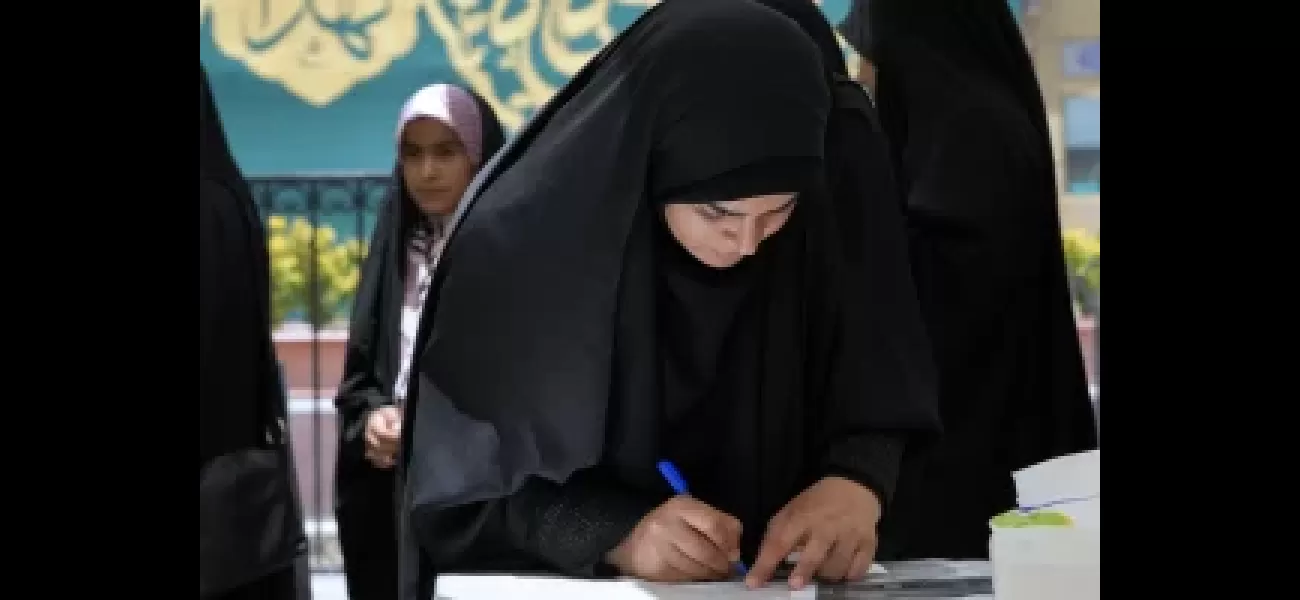Iran's election outcome shows tight contest between reformist Pezeshkian and hard-liner Jalili.
Early results in Iran's presidential election show a close race between reformist Masoud Pezeshkian and hard-liner Saeed Jalili, with a possible runoff vote.
June 29th 2024.

In the bustling city of Dubai, the results of Iran's presidential election were released early on Saturday, causing a stir among the citizens. The race seemed to be between reformist Masoud Pezeshkian and hard-liner Saeed Jalili, with the lead constantly shifting between the two men. As the numbers continued to be tallied, it appeared that a runoff vote would be necessary to determine the final outcome.
The Iranian state television reported these early results, but neither Pezeshkian nor Jalili were in a position to claim victory just yet. This raised the possibility of a runoff election to replace the late hard-line President Ebrahim Raisi. However, the turnout for the election was not yet disclosed, which was a crucial factor in understanding the support for the country's Shiite theocracy, especially in the midst of economic turmoil and mass protests.
So far, Pezeshkian had received 5.3 million votes while Jalili had 4.8 million after over 12 million votes were counted. Another hard-line candidate, Mohammad Bagher Qalibaf, had garnered 1.6 million votes, while Shiite cleric Mostafa Pourmohammadi received over 95,000 votes. The citizens had to choose between these three hard-line candidates and the lesser-known reformist Pezeshkian, who was a heart surgeon. As per tradition, women and those advocating for radical change were not allowed to run for office, and there were no international monitors overseeing the election.
The timing of the election was significant as tensions were already high in the Middle East due to the Israel-Hamas conflict in Gaza. In April, Iran had launched its first direct attack on Israel during the conflict, and its militia groups were actively involved in the fighting, escalating attacks on Israel. Additionally, Iran was also continuing to enrich uranium at near weapons-grade levels, with a stockpile large enough to build multiple nuclear weapons if desired.
There were calls for a boycott of the election, including from Nobel Peace Prize laureate Narges Mohammadi, who was currently imprisoned. Mir Hossein Mousavi, a leader in the 2009 Green Movement protests who was under house arrest, also refused to vote, as confirmed by his daughter. Some also criticized Pezeshkian as being just another government-approved candidate. In a documentary aired by state TV, one woman from Pezeshkian's generation stated that they were moving towards the same level of animosity with the government that their generation had during the 1979 revolution.
According to Iranian law, the winner must receive over 50% of all votes, and if this does not happen, the top two candidates will participate in a runoff election a week later. There has only been one runoff election in Iran's history, which was in 2005 when hard-liner Mahmoud Ahmadinejad defeated former President Akbar Hashemi Rafsanjani. The late President Raisi, who was 63 years old, passed away in a helicopter crash on May 19, along with the country's foreign minister and others. He was considered a protege of Iran's Supreme Leader Ayatollah Ali Khamenei and a potential successor. However, he was also known for his involvement in the mass executions of 1988 and the violent suppression of dissent following the protests over the death of Amini, a young woman who was detained for not wearing the mandatory headscarf.
The Iranian state television reported these early results, but neither Pezeshkian nor Jalili were in a position to claim victory just yet. This raised the possibility of a runoff election to replace the late hard-line President Ebrahim Raisi. However, the turnout for the election was not yet disclosed, which was a crucial factor in understanding the support for the country's Shiite theocracy, especially in the midst of economic turmoil and mass protests.
So far, Pezeshkian had received 5.3 million votes while Jalili had 4.8 million after over 12 million votes were counted. Another hard-line candidate, Mohammad Bagher Qalibaf, had garnered 1.6 million votes, while Shiite cleric Mostafa Pourmohammadi received over 95,000 votes. The citizens had to choose between these three hard-line candidates and the lesser-known reformist Pezeshkian, who was a heart surgeon. As per tradition, women and those advocating for radical change were not allowed to run for office, and there were no international monitors overseeing the election.
The timing of the election was significant as tensions were already high in the Middle East due to the Israel-Hamas conflict in Gaza. In April, Iran had launched its first direct attack on Israel during the conflict, and its militia groups were actively involved in the fighting, escalating attacks on Israel. Additionally, Iran was also continuing to enrich uranium at near weapons-grade levels, with a stockpile large enough to build multiple nuclear weapons if desired.
There were calls for a boycott of the election, including from Nobel Peace Prize laureate Narges Mohammadi, who was currently imprisoned. Mir Hossein Mousavi, a leader in the 2009 Green Movement protests who was under house arrest, also refused to vote, as confirmed by his daughter. Some also criticized Pezeshkian as being just another government-approved candidate. In a documentary aired by state TV, one woman from Pezeshkian's generation stated that they were moving towards the same level of animosity with the government that their generation had during the 1979 revolution.
According to Iranian law, the winner must receive over 50% of all votes, and if this does not happen, the top two candidates will participate in a runoff election a week later. There has only been one runoff election in Iran's history, which was in 2005 when hard-liner Mahmoud Ahmadinejad defeated former President Akbar Hashemi Rafsanjani. The late President Raisi, who was 63 years old, passed away in a helicopter crash on May 19, along with the country's foreign minister and others. He was considered a protege of Iran's Supreme Leader Ayatollah Ali Khamenei and a potential successor. However, he was also known for his involvement in the mass executions of 1988 and the violent suppression of dissent following the protests over the death of Amini, a young woman who was detained for not wearing the mandatory headscarf.
[This article has been trending online recently and has been generated with AI. Your feed is customized.]
[Generative AI is experimental.]
0
0
Submit Comment





